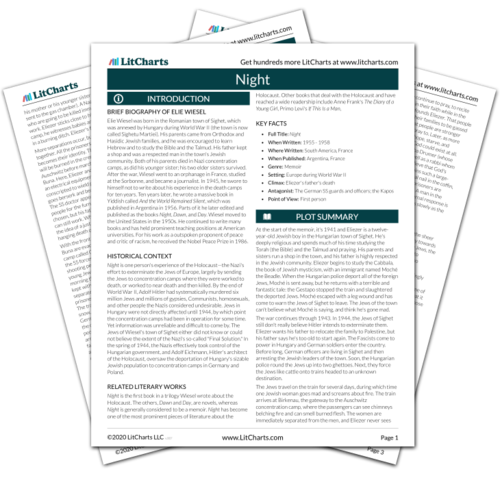In 1944, Elie Wiesel is a Jewish adolescent who devotes much time and emotion to studying the Talmud and Jewish mysticism under the tutelage of Moché the Beadle in the tiny village of Sighet, Transylvania (Romania). After being expelled by the Hungarian police because he was a foreigner, Moché the Beadle returns to the village, narrowly escaping an ambush by the Gestapo, to warn his Jewish brethren of the grave threat posed to them by the coming Nazi invaders. Nevertheless, Jewish leaders in Sighet remain relaxed and ambivalent, even after the Jewish people are shuffled into supervised ghettos. The following spring, German and Hungarian authorities begin shipping Jews via cramped trains to the Auschwitz-Birkenau complex. Elie and his family are shipped as part of the final convoy. Scores of villagers are crammed together into boxcars with scarcely any food and water to share between them. Madame Schächter, one of the deportees, becomes hysterical with (prophetic) visions of flames and furnaces.

Study Guide Questions for Night by Elie Weisel (2006 Translation) Section One (pages 3-22) 1. Describe Moishe the Beadle. A religious advisor for Elie who instructs him in the Kabbalah; Moishe is very awkward and poor. Why did Eliezer pray? Why did he cry when he prayed? He says that he does not know why he prays it is simply. Elie Wiesel's Night: Study Guide Questions & Answers. For his work as a outspoken proponent of peace and critic of racism, he received the Nobel Peace Prize in Download Historical Context of Night Night is one person's experience of the Holocaust—the Nazi's effort to exterminate the Jews of Europe, largely by sending the Jews to concentration camps where they were worked to death, or worked. Start studying Night Preface Discussion Questions. Learn vocabulary, terms, and more with flashcards, games, and other study tools.
Late into day three of the deportation, the group of captives sees terrifying flames rising above huge furnaces and recoils at the stench of burning flesh. Guards armed with clubs and guns separate Elie's group in to two groups: those fit for labor camps and those damned to the furnaces. Elie and his father, Chlomo, lie about their ages and are moved to the concentration camp at Auschwitz with other able-bodied men. Elie's mother and three sisters disappear into Birkenau, the death camp. Elie never sees any of them again. After viewing infants being tossed in a fiery pit, Elie abandons his faith in a God he accuses of remaining silent and indifferent to the atrocities.
Every day, Elie and his father struggle to maintain their strength in order to remain in the “Fit to work” group. Cruel guards impose sadistic and erratic punishments. After three weeks, Elie and his father are forced to march to Buna, a factory in the Auschwitz complex, where they sort electrical parts in an electronics warehouse. The cruelty culminates with the guards hanging an adolescent. Elie watches as he dies in a torturously slow manner.
Despairing, Elie becomes increasingly depressed during Rosh Hashanah services. At the next selection, the doctor chooses his father. Chlomo, however, passes a second physical exam and is spared from the furnaces. Elie undergoes surgery to repair his foot that has swollen with pus.

Night Preface Study Guide Answers Chapter
Because Russian liberation forces are moving ever closer to the Nazi camp, the guards evacuate Buna in January 1945. The captives are herded through the European forests during the night in bitter cold over forty miles en route to Gleiwitz. Elie wraps his bleeding foot in strips of blanket. Jews who falter are shot. Elie prays for strength to save his father from death. Those who survive the arduous trek pile together in a crammed cabin. Surviving for three days on only fistfuls of snow, the remaining captives are packed onto a train for a week-and-a-half long ride to Buchenwald in central Germany. In the end, Elie and Chlomo are among the only twelve captives who survive the entire ordeal.
Night Preface Pdf
Elie tries to nurse his father back to health. Dysentery, malnutrition, and vicious violence gradually rob Chlomo of the few days of life he has left. Elie degenerates into a minor frenzy after the deterioration of his father. When he recovers, his father is gone. Elie fears he was sent to the fiery furnaces while he was still clinging to life. Resistance breaks out in Buchenwald. In the springtime, American forces liberate the camp. Elie is so devastated by his tribulations he stares at himself in a mirror and can discern only the reflection of a corpse.